The Florida State Seminoles are the athletic teams representing Florida State University located in Tallahassee, Florida. They compete as a member of the National Collegiate Athletic Association Division I level, primarily competing in the Atlantic Coast Conference for all sports since the 1991–92 season; within the Atlantic Division in any sports split into a divisional format since the 2005–06 season.
The Seminoles' athletic department fields 20 teams. They have collectively won 20 team national championships, and over 100 team conference championships, as well as numerous individual national and conference titles.
Overview
Florida State Athletics began in 1902 when the then Florida State College football teams played three seasons. The 1905 Buckman Act reorganized the existing seven Florida colleges into three institutions, segregated by race and gender. As a result of this reorganization, the coeducational Florida State College was renamed the Florida State College for Women. The Florida State University again became a co-ed institution in 1947 with most of the newly enrolled male students back from service in World War II. Athletic programs resumed and Florida State fielded its first football team in 43 years with FSU facing Stetson on October 18, 1947.
Florida State was a founding member of the Dixie Conference, in 1948, when other southern institutions seeking to create a "purely amateur" athletic conference based on the principle of complete amateurism, with no athletic scholarships. Three years later, FSU left the conference to become an independent, having won ten conference titles including three in football and two in men's track and field.
In 1976, Florida State joined the Metro Conference in all sports except football, which remained independent. For fifteen years FSU competed and won sixty-eight conference titles as well as five national titles including two in softball, two in women's track and field, and one in women's golf.
Since 1991, Florida State has been a member of the Atlantic Coast Conference. Since joining the conference, FSU has won ninety-six ACC titles and nine national titles including three in football, three in men's track and field, two in soccer, and one in softball. After the 2005 conference expansion was complete, FSU was placed in the newly formed Atlantic Division.
Florida State's school colors of garnet and gold are a merging of the university's past. In 1904 and 1905, the Florida State College won football championships wearing purple and gold uniforms. When FSC became Florida State College for Women in 1905, the FSCW student body selected crimson as the official school color. The administration in 1905 took crimson and combined it with the recognizable purple of the championship football teams to achieve the color garnet. The garnet and gold colors were first used on an FSU uniform in a 14–6 loss to Stetson on October 18, 1947.
On April 11, 2014, as part of the university's 'Ignition Tradition' rebranding of the program, white and black were added to the official school colors. The addition of the two colors is to better represent the colors present on the flag of the Seminole Tribe of Florida.
Mascot
History
The "Seminoles" name, chosen by students in a 1947 vote, alludes to Florida's Seminole people who in the early nineteenth century resisted efforts of the United States government to remove them from Florida. Since 1978 the teams have been represented by the symbols Osceola and Renegade. The symbol represents an actual historical figure, Seminole war leader Osceola, whose clothing represents appropriate period dress. The athletic logo, in use since the early 1970s, shows a profile of a shouting Seminole warrior in circle. The model for the logo was Florida State music faculty member Thomas Wright, composer of the Florida State University Fight Song and Victory Song.
The university maintains that they do not officially have a mascot, but use the Seminole name in “admiration” of the unconquered tribe. However, the figures of Osceola and Renegade, as well as the athletic logo, are used in a way that is indistinguishable from other mascots; they are used to rally the crowd at sporting events, and emblazoned on T-shirts and other merchandise.
Controversy
The use of names and images associated with Seminole history is officially sanctioned by the Seminole Tribe of Florida. In 2005, the Tribal Council produced a written resolution affirming their support for the use of their symbolism, and FSU states that they take pride in their “continued collaboration with the tribe”. This included Native American mascots, and FSU was specifically flagged as a university with potentially offensive imagery.
Though the Florida Seminole Tribal Council made this agreement, they only represent Florida's portion of the Seminole people. In 2013, the Seminole Nation of Oklahoma, which has about four times as many registered members as Florida's Seminole tribe, passed a resolution condemning the use of such imagery on sports teams, making no exception for the kind of agreement FSU made with the Seminole Tribe of Florida. The American Psychological Association has made similar statements about the negative effects of Indigenous mascots, arguing that they promote stereotypes, establish a hostile environment, and undermine the Nations’ ability to accurately represent their culture. Students and other members of the Florida State community have also argued against the use of Native imagery, posting about it on school blogs and starting a Change.org petition in August 2021 to “ban racist traditions at FSU”.
Rivalries
Florida State maintains two traditional rivals in all sports with the Florida Gators and the Miami Hurricanes. Florida State University is the only school in the State of Florida to play both Florida and Miami year in and year out in all sports. Most notably is the football rivalry with the Gators who hold a 37–27–2 all-time lead against the Seminoles. The series began with Florida dominating for the first few years, but it has since become more balanced. The football rivalry with Miami dates back to 1951, when the Hurricanes defeated the Seminoles 35–13 in their inaugural meeting. The schools have played uninterrupted since 1966, with Miami holding the all-time advantage, 35–32. Florida State holds a 12–7 advantage since the Hurricanes became a conference foe in 2004.
Florida State developed a rivalry with Clemson after being placed in the same division of the conference after the 2004 season. Florida State leads the all-time series 20–15. In addition to their in-state rivals, Florida State enjoys baseball rivalries as well, primarily with Georgia Tech.
Florida State University was founded with money donated by Francis Eppes VII, a grandson of Thomas Jefferson, the third President of the United States, principal author of the Declaration of Independence, and founder of the University of Virginia. As a result, both teams play for the Jefferson-Eppes Trophy in football. With the recent realignment of the divisions, the Seminoles found themselves in one division and the Cavaliers in another.
Athletic directors
Florida State has had 17 athletic directors in its history.
Howard Danford, 1947–1956
Tom Nugent, 1957–1958
Perry Moss, 1959
Vaughn Mancha, 1959–1971
Clay Stapleton, 1971–1973
John Bridgers, 1973–1979
Phil Fordyce, 1979–1981
Cecil Ingram, 1981–1989
Bob Goin, 1990–1994
Wayne Hogan, 1994
Dave Hart Jr., 1995–2007
William L. Proctor, 2007–2008
Randy Spetman, 2008–2013
Vanessa Fuchs, 2013
Stan Wilcox, 2013–2018
David Coburn, 2018–2022
Michael Alford, 2022–present
Teams
2006–2010 NCAA penalties
The athletic department emerged in January 2010 from NCAA sanctions resulting from the discovery of academic cheating by athletes in 2006–2007. This discovery involved athletes in ten sports programs who were taking an online course in music history. An NCAA investigation resulted in scholarship limits and negation of wins involving compromised athletes. Florida State appealed parts of the decision. The penalties removed fourteen football wins from the career total of Seminoles football coach Bobby Bowden, yet the coach temporarily claimed the all-time record for Division 1 football wins in 2012 when a far larger number of victories was deducted from the career total of Pennsylvania State University football coach Joe Paterno. Paterno's wins were later reinstated, however, following an appeal from the Penn State Board of Trustees in January 2015., leaving Coach Bowden with the 2nd all-time winningest record in Division 1 football.
Additionally, FSU vacated 22 wins in men's basketball, an NCAA post season baseball victory, one national championship in men's track and field, an NCAA tournament victory in women's basketball, as well as other wins in these and several other men's and women's sports.
Eye-catching new design Florida State Seminoles clothing will be the perfect gift for Florida State Seminoles fans. Clothing on printed with unique and fancy designs, limited number of products.
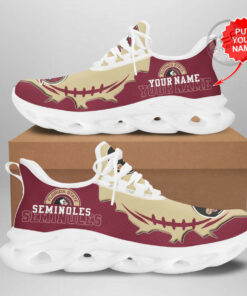
Florida State Seminoles Sneaker – Seminoles shoes
$98.95 $85.95
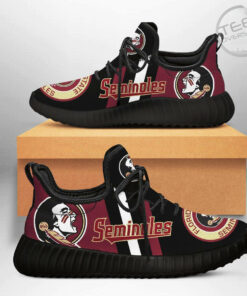
Florida State Seminoles Custom Sneakers – Seminoles shoes
$85.95 – $85.98
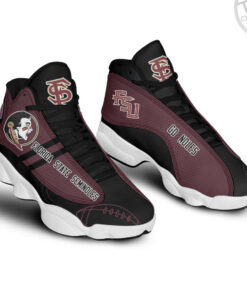
Florida State Seminoles shoes – Seminoles sneakers
$89.95 – $89.98
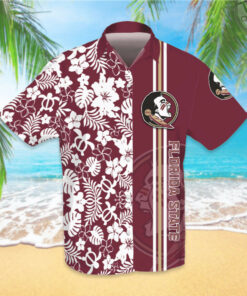
Florida State Seminoles Hawaiian Shirt, Hawaiian Shorts 3D – Seminoles Clothes
$42.95 – $43.95
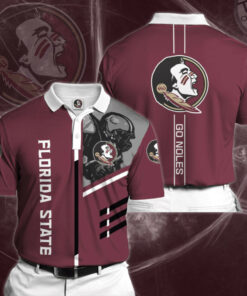
Florida State Seminoles Polo 3D – Seminoles Clothes
$41.95 – $41.98
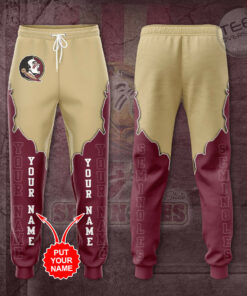
Florida State Seminoles Sweatpant 3D – Seminoles Clothes
$45.95 – $45.98
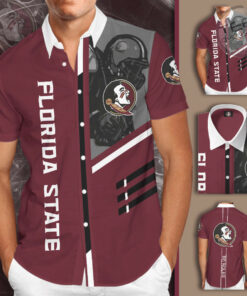
Florida State Seminoles Short Sleeve Dress Shirt 3D – Seminoles Clothes
$35.95 – $35.98
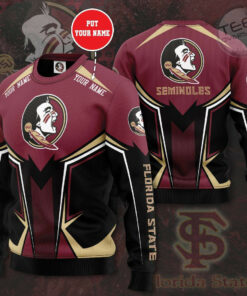
Florida State Seminoles Sweatshirt 3D – Seminoles Clothes
$41.95 – $41.98
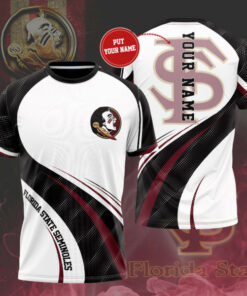
Florida State Seminoles T-shirt 3D – Seminoles Clothes
$29.95 – $29.98
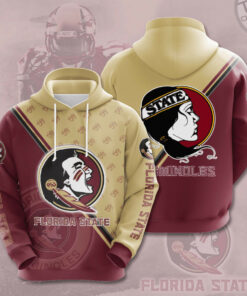
Florida State Seminoles Hoodie 3D – Seminoles Clothes
$45.95 – $45.98
The Seminoles' athletic department fields 20 teams. They have collectively won 20 team national championships, and over 100 team conference championships, as well as numerous individual national and conference titles.
Overview
Florida State Athletics began in 1902 when the then Florida State College football teams played three seasons. The 1905 Buckman Act reorganized the existing seven Florida colleges into three institutions, segregated by race and gender. As a result of this reorganization, the coeducational Florida State College was renamed the Florida State College for Women. The Florida State University again became a co-ed institution in 1947 with most of the newly enrolled male students back from service in World War II. Athletic programs resumed and Florida State fielded its first football team in 43 years with FSU facing Stetson on October 18, 1947.
Florida State was a founding member of the Dixie Conference, in 1948, when other southern institutions seeking to create a "purely amateur" athletic conference based on the principle of complete amateurism, with no athletic scholarships. Three years later, FSU left the conference to become an independent, having won ten conference titles including three in football and two in men's track and field.
In 1976, Florida State joined the Metro Conference in all sports except football, which remained independent. For fifteen years FSU competed and won sixty-eight conference titles as well as five national titles including two in softball, two in women's track and field, and one in women's golf.
Since 1991, Florida State has been a member of the Atlantic Coast Conference. Since joining the conference, FSU has won ninety-six ACC titles and nine national titles including three in football, three in men's track and field, two in soccer, and one in softball. After the 2005 conference expansion was complete, FSU was placed in the newly formed Atlantic Division.
Florida State's school colors of garnet and gold are a merging of the university's past. In 1904 and 1905, the Florida State College won football championships wearing purple and gold uniforms. When FSC became Florida State College for Women in 1905, the FSCW student body selected crimson as the official school color. The administration in 1905 took crimson and combined it with the recognizable purple of the championship football teams to achieve the color garnet. The garnet and gold colors were first used on an FSU uniform in a 14–6 loss to Stetson on October 18, 1947.
On April 11, 2014, as part of the university's 'Ignition Tradition' rebranding of the program, white and black were added to the official school colors. The addition of the two colors is to better represent the colors present on the flag of the Seminole Tribe of Florida.
Mascot
History
The "Seminoles" name, chosen by students in a 1947 vote, alludes to Florida's Seminole people who in the early nineteenth century resisted efforts of the United States government to remove them from Florida. Since 1978 the teams have been represented by the symbols Osceola and Renegade. The symbol represents an actual historical figure, Seminole war leader Osceola, whose clothing represents appropriate period dress. The athletic logo, in use since the early 1970s, shows a profile of a shouting Seminole warrior in circle. The model for the logo was Florida State music faculty member Thomas Wright, composer of the Florida State University Fight Song and Victory Song.
The university maintains that they do not officially have a mascot, but use the Seminole name in “admiration” of the unconquered tribe. However, the figures of Osceola and Renegade, as well as the athletic logo, are used in a way that is indistinguishable from other mascots; they are used to rally the crowd at sporting events, and emblazoned on T-shirts and other merchandise.
Controversy
The use of names and images associated with Seminole history is officially sanctioned by the Seminole Tribe of Florida. In 2005, the Tribal Council produced a written resolution affirming their support for the use of their symbolism, and FSU states that they take pride in their “continued collaboration with the tribe”. This included Native American mascots, and FSU was specifically flagged as a university with potentially offensive imagery.
Though the Florida Seminole Tribal Council made this agreement, they only represent Florida's portion of the Seminole people. In 2013, the Seminole Nation of Oklahoma, which has about four times as many registered members as Florida's Seminole tribe, passed a resolution condemning the use of such imagery on sports teams, making no exception for the kind of agreement FSU made with the Seminole Tribe of Florida. The American Psychological Association has made similar statements about the negative effects of Indigenous mascots, arguing that they promote stereotypes, establish a hostile environment, and undermine the Nations’ ability to accurately represent their culture. Students and other members of the Florida State community have also argued against the use of Native imagery, posting about it on school blogs and starting a Change.org petition in August 2021 to “ban racist traditions at FSU”.
Rivalries
Florida State maintains two traditional rivals in all sports with the Florida Gators and the Miami Hurricanes. Florida State University is the only school in the State of Florida to play both Florida and Miami year in and year out in all sports. Most notably is the football rivalry with the Gators who hold a 37–27–2 all-time lead against the Seminoles. The series began with Florida dominating for the first few years, but it has since become more balanced. The football rivalry with Miami dates back to 1951, when the Hurricanes defeated the Seminoles 35–13 in their inaugural meeting. The schools have played uninterrupted since 1966, with Miami holding the all-time advantage, 35–32. Florida State holds a 12–7 advantage since the Hurricanes became a conference foe in 2004.
Florida State developed a rivalry with Clemson after being placed in the same division of the conference after the 2004 season. Florida State leads the all-time series 20–15. In addition to their in-state rivals, Florida State enjoys baseball rivalries as well, primarily with Georgia Tech.
Florida State University was founded with money donated by Francis Eppes VII, a grandson of Thomas Jefferson, the third President of the United States, principal author of the Declaration of Independence, and founder of the University of Virginia. As a result, both teams play for the Jefferson-Eppes Trophy in football. With the recent realignment of the divisions, the Seminoles found themselves in one division and the Cavaliers in another.
Athletic directors
Florida State has had 17 athletic directors in its history.
Howard Danford, 1947–1956
Tom Nugent, 1957–1958
Perry Moss, 1959
Vaughn Mancha, 1959–1971
Clay Stapleton, 1971–1973
John Bridgers, 1973–1979
Phil Fordyce, 1979–1981
Cecil Ingram, 1981–1989
Bob Goin, 1990–1994
Wayne Hogan, 1994
Dave Hart Jr., 1995–2007
William L. Proctor, 2007–2008
Randy Spetman, 2008–2013
Vanessa Fuchs, 2013
Stan Wilcox, 2013–2018
David Coburn, 2018–2022
Michael Alford, 2022–present
Teams
2006–2010 NCAA penalties
The athletic department emerged in January 2010 from NCAA sanctions resulting from the discovery of academic cheating by athletes in 2006–2007. This discovery involved athletes in ten sports programs who were taking an online course in music history. An NCAA investigation resulted in scholarship limits and negation of wins involving compromised athletes. Florida State appealed parts of the decision. The penalties removed fourteen football wins from the career total of Seminoles football coach Bobby Bowden, yet the coach temporarily claimed the all-time record for Division 1 football wins in 2012 when a far larger number of victories was deducted from the career total of Pennsylvania State University football coach Joe Paterno. Paterno's wins were later reinstated, however, following an appeal from the Penn State Board of Trustees in January 2015., leaving Coach Bowden with the 2nd all-time winningest record in Division 1 football.
Additionally, FSU vacated 22 wins in men's basketball, an NCAA post season baseball victory, one national championship in men's track and field, an NCAA tournament victory in women's basketball, as well as other wins in these and several other men's and women's sports.
Eye-catching new design Florida State Seminoles clothing will be the perfect gift for Florida State Seminoles fans. Clothing on printed with unique and fancy designs, limited number of products.

Florida State Seminoles Sneaker – Seminoles shoes
$98.95 $85.95

Florida State Seminoles Custom Sneakers – Seminoles shoes
$85.95 – $85.98

Florida State Seminoles shoes – Seminoles sneakers
$89.95 – $89.98

Florida State Seminoles Hawaiian Shirt, Hawaiian Shorts 3D – Seminoles Clothes
$42.95 – $43.95

Florida State Seminoles Polo 3D – Seminoles Clothes
$41.95 – $41.98

Florida State Seminoles Sweatpant 3D – Seminoles Clothes
$45.95 – $45.98

Florida State Seminoles Short Sleeve Dress Shirt 3D – Seminoles Clothes
$35.95 – $35.98

Florida State Seminoles Sweatshirt 3D – Seminoles Clothes
$41.95 – $41.98

Florida State Seminoles T-shirt 3D – Seminoles Clothes
$29.95 – $29.98

Florida State Seminoles Hoodie 3D – Seminoles Clothes
$45.95 – $45.98
Comments
Post a Comment